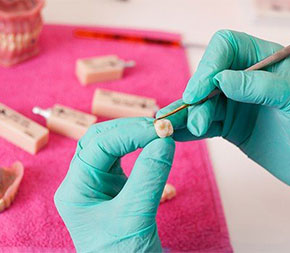
Dental Lab Technician Overview
What Is a Dental Lab Technician?
A dental lab technician plays a crucial role in creating dental appliances like crowns, bridges, and dentures. They utilize impressions or molds of patients’ teeth to fabricate these custom-made dental devices. While working closely with dentists, dental lab technicians have limited direct contact with patients, focusing primarily on the precise craftsmanship and technical skills required for producing high-quality dental restorations. Often mistakenly confused with dental hygienists, they are however distinct, each skilled in their separate and specialized trade.
Dental Technician Job Description
Using a dentists’ detailed written directions, and molds of a patient’s teeth or oral soft tissues, you’ll make the following items:
Dental lab technicians can also specialize in one of five areas: orthodontic appliances, crowns and bridges, complete dentures, partial dentures and ceramics.
Median Annual Dental Lab Technician Salary
The U.S. Bureau of Labor Statistics 2023 Occupational Employment Statistics reports the median annual salary for dental lab technicians as $47,690.
They list the following median annual salaries by state:
Schooling
Although each program has unique entry requirements, a high school diploma or GED is a standard prerequisite for applying to an accredited dental lab technology program.
Some dental technicians begin careers without a college degree, but you’ll find it’s easiest to start your career by pursuing formal training through an accredited program. There are 2-year dental lab technician programs leading to an associate’s degree or certificate; a few 4-year bachelor’s programs are also available. These programs are offered at community colleges, vocational schools, technical colleges, universities and dental schools.
In addition to formal training, you’ll find the following skills will serve you well in your dental technician career:
Dental Lab Tech Certification
There is no license required for dental lab technicians, but optional certification is available. Certification recognizes a dental lab technician’s knowledge and technical skills. It involves passing an exam administered by the National Board for Certification in Dental Laboratory Technology. In order to take the certification exam, you must have completed an accredited dental laboratory technology program and have had two years of professional experience, or, if you’ve been trained on the job or through a non-accredited program, you can take the exam after five years of work experience as a dental lab technician. Upon passing the exam, you become a Certified Dental Technician (CDT).